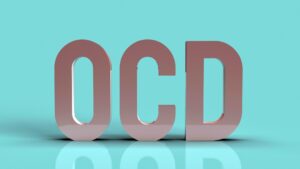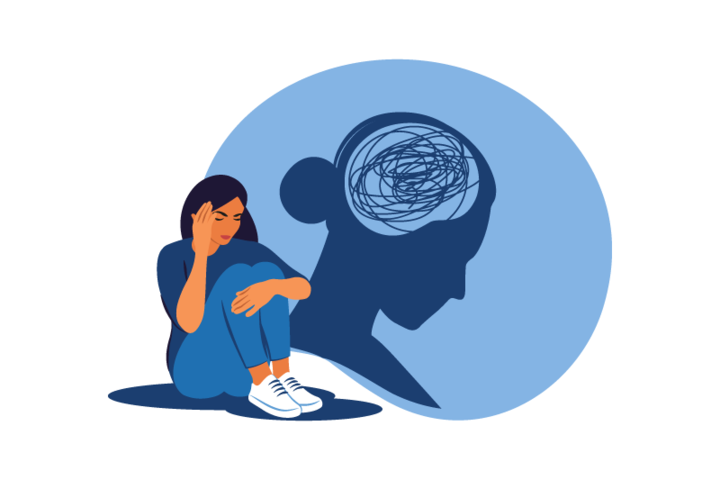Obsessive-Compulsive Disorder (OCD) is more than just a habit of cleanliness or a quirky inclination towards order. It’s a complex mental health condition characterized by unwanted, persistent thoughts and ritualistic behaviors that can significantly disrupt daily life. This blog aims to demystify OCD by exploring its symptoms, causes, and treatment options.
Contents
What is OCD?
 Obsessive-Compulsive Disorder (OCD) is a mental health condition where a person experiences recurring, unwanted thoughts, ideas, or sensations (obsessions) that drive them to do something repetitively (compulsions). These repetitive behaviors, such as hand washing, checking on things, or cleaning, can significantly interfere with a person’s daily activities and social interactions.
Obsessive-Compulsive Disorder (OCD) is a mental health condition where a person experiences recurring, unwanted thoughts, ideas, or sensations (obsessions) that drive them to do something repetitively (compulsions). These repetitive behaviors, such as hand washing, checking on things, or cleaning, can significantly interfere with a person’s daily activities and social interactions.
The cause of these behaviors is a need to relieve the stress and anxiety caused by the obsessions. Although performing these compulsions provides temporary relief, the cycle of OCD begins again with the return of the obsessive thoughts. OCD is more than just being very neat or liking things a certain way; it can be a serious condition that requires medical attention.
How To Tell If Someone Has OCD?
Identifying whether someone has Obsessive-Compulsive Disorder (OCD) involves observing specific signs and symptoms that typically manifest as repetitive behaviors and intrusive thoughts. Here are key indicators to watch for:
- Obsessions: These are persistent, unwanted thoughts, urges, or images that cause distress or anxiety. Common obsessions include fears of contamination, a need for symmetry, aggressive or horrific impulses, or sexual imagery that the person may find disturbing.
- Compulsions: These are repetitive behaviors or mental acts that a person feels driven to perform in response to an obsession or according to rules that must be applied rigidly. Common compulsions include excessive cleaning or handwashing, ordering things in a precise way, repeatedly checking on things (like whether the door is locked or the oven is off), and compulsive counting.
- Distress and Anxiety: The obsessions cause significant distress or anxiety. In an attempt to relieve this stress, the person engages in compulsive behaviors, which can create a cycle that significantly interferes with daily functioning.
- Recognition of Excessiveness: Often, individuals with OCD realize that their obsessions are irrational, and their compulsive behaviors are excessive. However, they may feel unable to control them without help.
- Time Consumption: The obsessions and compulsions consume an hour or more each day or significantly interfere with the person’s daily routine, work, social activities, or relationships.
- Seeking Reassurance: Frequently seeking assurance from others about their obsessions or compulsions is a common sign, as is needing others to participate in their compulsive behaviors.
- Avoidance: Avoiding places, situations, or objects that may trigger their obsessions or make their compulsions apparent to others.
Hence, if you notice these signs in someone, encourage them to seek a professional diagnosis and treatment. OCD is treatable, and many find relief through a combination of therapy and medication.
Can Someone With OCD Fall in Love?
 Yes, absolutely! Individuals with Obsessive-Compulsive Disorder (OCD) can and do form romantic relationships and fall in love, just like anyone else. However, their experience in a relationship can be uniquely challenged by their symptoms.
Yes, absolutely! Individuals with Obsessive-Compulsive Disorder (OCD) can and do form romantic relationships and fall in love, just like anyone else. However, their experience in a relationship can be uniquely challenged by their symptoms.
For example, obsessions and compulsions can sometimes intrude into their relationship dynamics or affect their emotional availability. Concerns about cleanliness, symmetry, or other specific fears might also play a significant role in how they interact with partners.
Despite these challenges, relationships can be fulfilling and supportive. Partners of those with OCD can play a crucial role in their treatment and management of symptoms. Thus, helping to establish a stable and supportive environment. Therefore, while OCD may add complexities to romantic relationships, it certainly does not prevent individuals from experiencing and enjoying love.
What Are The Risks and Triggers to Know?
When managing Obsessive-Compulsive Disorder (OCD), it’s crucial to understand the potential risks and triggers that can exacerbate the condition. Here’s an overview:
Risks
- Stress: High levels of stress can worsen OCD symptoms. Stressful life events, like a job change, moving, or the loss of a loved one can trigger more intense and frequent obsessions and compulsions.
- Changes in Routine: OCD symptoms can flare up during changes in routine or environment, as the predictability and control over surroundings lessen.
- Other Mental Health Disorders: Individuals with OCD often have co-occurring disorders such as anxiety, depression, or ADHD. This can complicate the treatment and management of OCD.
- Poor Sleep: Lack of adequate sleep can exacerbate symptoms. Hence, making them more difficult to manage.
- Substance Use: Using drugs or alcohol to cope with OCD can worsen symptoms. Also, leads to additional health problems.
Triggers
- Specific Objects or Situations: Depending on the nature of an individual’s obsessions, certain objects (like doorknobs or toilets) or situations (like being in a crowd) can trigger compulsive behaviors.
- Media Content: Watching or reading content that touches on a person’s specific fears or obsessions (like stories about illnesses or accidents) can trigger OCD symptoms.
- Disruptions in Personal Life: Personal conflicts, relationship issues, or family dynamics can trigger or heighten OCD symptoms, particularly if they disrupt routines or lead to increased stress.
- Health Concerns: Any personal or family health issues, particularly those related to contamination or illness, can significantly trigger OCD symptoms in individuals with related obsessions.
- Feedback or Criticism: Negative feedback or criticism, even if well-intentioned or constructive, can sometimes trigger compulsive behavior as a coping mechanism.
Thus, understanding these risks and triggers is a vital step in managing OCD effectively. It allows individuals and their caregivers to develop strategies to minimize exposure to triggers and address the risks in a structured way. This is often through therapeutic techniques like CBT and ERP.
How to Stop OCD?
 Stopping or managing Obsessive-Compulsive Disorder involves a combination of professional treatment and self-help strategies. While professional help is crucial, self-help strategies can also play an essential role in managing symptoms. Here are some effective techniques to help:
Stopping or managing Obsessive-Compulsive Disorder involves a combination of professional treatment and self-help strategies. While professional help is crucial, self-help strategies can also play an essential role in managing symptoms. Here are some effective techniques to help:
1. Education About OCD
Understanding OCD is the first step towards managing it. Educate yourself about the disorder to understand the symptoms, triggers, and treatments. Knowledge can empower you to take control and reduce fears about unusual thoughts or behaviors.
2. Mindfulness and Meditation
Practicing mindfulness can help you stay grounded in the present moment and reduce the power of obsessive thoughts. Meditation can help manage stress and anxiety, which are common in those with OCD.
3. Exposure and Response Prevention (ERP)
This is a self-directed version of a common professional treatment for OCD. It involves gradually exposing yourself to the source of your fear and refraining from performing your typical compulsive behaviors. Start small and increase the challenge as you become more comfortable.
4. Stress Management Techniques
Since stress can exacerbate OCD symptoms, using stress reduction techniques can be helpful. This might include yoga, deep breathing exercises, or regular physical exercise.
5. Routine Maintenance
Keeping a regular schedule can help reduce the unpredictability that might trigger OCD symptoms. Structured routines around sleep, meals, and exercise can provide a sense of control and stability.
6. Avoidance of Substance Abuse
Alcohol and drugs can increase anxiety and disrupt emotional regulation and judgment, potentially worsening OCD symptoms. Staying clear of these substances can help in managing symptoms better.
7. Journaling
Keeping a journal can be a therapeutic way to express thoughts, fears, and frustrations. So, writing down what you feel can sometimes reduce the power of these thoughts and emotions.
8. Support Networks
Joining an OCD support group or online community can provide insights and encouragement from others who understand what you’re going through. Sharing experiences and coping strategies can be incredibly supportive.
9. Limit Exposure to Triggers
If certain activities or information sources consistently trigger your symptoms, try to limit your exposure. This could mean setting boundaries around media consumption or avoiding specific situations known to provoke your OCD.
10. Developing Healthy Habits
Eating a balanced diet, exercising regularly, and getting enough sleep can significantly affect mental health. Hence, reducing the severity of OCD symptoms.
Hence, implementing these self-help strategies can enhance your ability to manage OCD. However, they are most effective when used in conjunction with professional treatment, such as therapy or medication. Always consider consulting with a mental health professional to develop a comprehensive approach tailored to your specific needs.
Conclusion
Living with Obsessive-Compulsive Disorder (OCD) can be challenging, but understanding the disorder and adopting effective management strategies can significantly improve quality of life. By learning about the symptoms, risks, and triggers of OCD, and implementing self-help techniques, individuals can regain control and reduce the impact of OCD on their daily lives. Although self-help methods are valuable, professional guidance from therapists and medical practitioners remains crucial in navigating this complex condition.
Take care, and don’t forget that you are not alone! OCD is a mental health disorder characterized by obsessions and compulsions. If you have any queries regarding OCD treatment, ERP therapy experienced therapists at OCDMantra can help: Book a trial OCD therapy session


